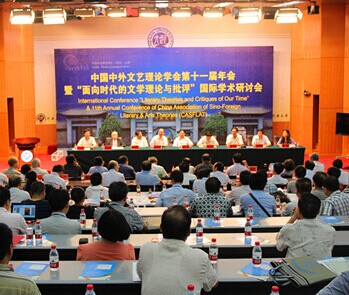Literature captures essence of the times

The International Conference “Literary Theories and Critiques of Our Time” & 11thAnnual Conference of China Association of Sino-Foreign Literary and Arts Theories (CASFLAT) holding at Henan University
The International Conference “Literary Theories and Critiques of Our Time” & 11th Annual Conference of China Association of Sino-Foreign Literary and Arts Theories (CASFLAT) took place at Henan University from Aug. 16 to 18. Zhang Jiang, vice president of CASS, attended the opening ceremony.
In his opening remark, Zhang commended the significance of addressing the application of theoretical research into current literary practice and social life. He stressed that academic research needs to maintain a focus on the current era and realistic problems.
“Reflecting social realities and capturing nature of the human mind, literature is always representative of an era’s spiritual value”, he said. As contemporary China continues to make great strides, its social life is constantly changing and its cultural landscape is always in the process of being enriched. As such, tremendous changes have taken place in the life experiences of authors and their methods of creation as well as the reading habits of readers and their aesthetic sensibilities. A great era requires great literature, and great literature needs strong, serious and proper literary criticism as well as profound, correct and scientific theory, he continued.
Zhang also gave a keynote speech titled “Systematic Development: Theory After Theory.” In this speech, Zhang elaborated on the reasons why contemporary Western literary theories have simultaneously witnessed both prosperity and decline, offering a new perspective of interpreting its overall landscape, that is the concept of systematic development.
Zhang noted that systematic development has two aspects. From the diachronic perspective, it should absorb all the beneficial achievements in history and apply them to the whole process of theoretical construction. From the synchronic perspective, it needs to integrate various advancing factors, facilitating a new system. The systematic development of a theory not only means the overall development of itself but also its internal development in all directions and on various levels, which helps each other and works together. Systematic development is the internal motivation for theoretical growth and a significant mark of the maturity of a theory and a discipline.
More than 400 scholars and experts from Chinese research institutes and universities including CASS, the Chinese National Academy of Arts, Peking University, Tsinghua University and Renmin University of China, as well as researchers from the United States and Slovenia had an in-depth discussion on literary theory under the theme of “literary theory and criticism keeping pace with the times.”
Gao Jianping, president of the International Association of Aesthetics, chairman of the China Association of Sino-foreign Literary and Arts Theories and deputy director of the Institute of Literature of CASS, elaborated on whether literary theory, as a discipline, has an independent history.
He noted that its independence can be first shown by the way literary theory affects the development of literature and literary writing through its interpretation of literary concepts. Second, literary theory has more resources to draw upon in addition to literary criticism. It is guided by other disciplines like philosophy, ethics, psychology, linguistics, society and culture. Modern literary theory integrates literary criticism and theoretical construction. Literary theory first of all needs to be rooted in the ground of literary phenomena. At the same time, literary theory has its own history of birth, development, maturity and decline.
Lu Jiande, director of the Institute of Literature of CASS, talked about Chinese discourse in literary criticism. He said that the issue was put forward after a prolonged debate within the academia, indicating that contemporary scholars have a high level of self-consciousness. However, while heated topics on literary criticism are emerging, most of its discourse focuses on merely what is popular with little attention on rich life content and historical significance. We can have robust discourse only after we make convincing achievements in specific research fields, Lu said.
At the panel “visual culture and literary theory,” American scholars Curtis Carter and Tyrus Millter and Slovenian scholar Ales Erjavec discussed the relationship between words and images in contemporary literature and art. As images become increasingly significant in people’s lives today, research helps reexamine the characteristics and features of literature and literary theory.
The conference was co-organized by the China Association of Sino-foreign Literary and Arts Theories, the Institute of Literature of CASS, the International Association of Aesthetics, and the College of Chinese Language and Literature of Henan University. Lou Yuangong, president of Henan University and Li Honghui, deputy director-general of the Department of Publicity at CPC Henan Provincial Committee, also attended the opening ceremony.
The Chinese version appeared in Chinese Social Sciences Today, No. 638, Aug.25, 2014
The Chinese link is: http://news.cssn.cn/zx/bwyc/201408/t20140825_1302290.shtml
Translated by Jiang Hong
